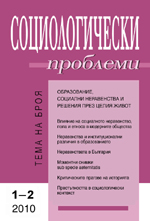Социален произход, избор на училище и успех на учениците
Social Origin, School Choice and Student Performance
Author(s): Péter RóbertSubject(s): Social Sciences
Published by: Институт по философия и социология при БАН
Summary/Abstract: The paper defines educational markets based on the major divisions existing in the school system like 1) public vs. private; 2) tracking either by academic vs. vocational curriculum or by ability; and 3) schools’ practice regarding admittance of students. It is assumed that sector of schools, tracking practice as well as admittance rules create a ‘market’, put the schools into various positions in the educational ‘field’ and parents consider these options when deciding about school choice. In addition to this ‘input-effect’ leading most probably to differences in school composition regarding social background of the pupils, there is also an ‘output-effect’, namely that school’s position in the market has an impact on students’ school performance. The paper investigates the statistical relationship between parental background and type of school, the offspring attend. It is assumed that parents with higher status prefer to choose schools with stronger academic curriculum, using academic criteria to select students, belonging to private sector and applying some ability grouping. Moreover, the paper estimates the impact of the school’s market position on the performance of their students. It is expected that pupils will perform better in schools with stronger academic curriculum, in the private sector, applying some practice for selection based on previous qualification and grouping the students by ability. The paper uses the data form the PISA 2006 survey. The analysis on the odds of school choice confirms the assumptions with the exception of ability tracking. For the impact of the various market- characteristics on performance most of the assumptions are verified but ability grouping does not improve achievement. Applying interaction terms, shows that students from high status families benefit more from the education market with the exception of the religious schools. This article investigates how social disparities in attending Gymnasium and qualifying for higher education in Germany have developed since the early 20th century. It discusses changes in institutional and structural conditions over time, and outlines their theoretical implications for primary and secondary social disparities in access to higher education. Analyses based on data from various representative population surveys and many years of Microcensus data then show how the influence of social origin on access to higher education declined for both men and women in different historical periods. Recent data show that women’s educational participation is less dependent on social origin than men’s. This finding partially explains why more women than men now obtain higher education.
Journal: Социологически проблеми
- Issue Year: 42/2010
- Issue No: 1-2
- Page Range: 118-145
- Page Count: 28
- Language: Bulgarian
- Content File-PDF

